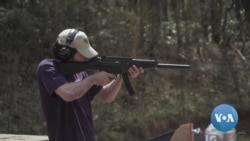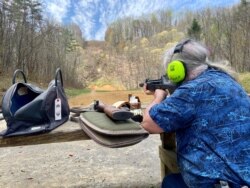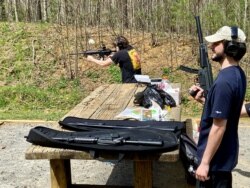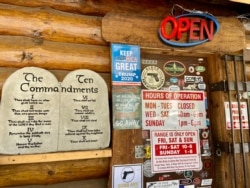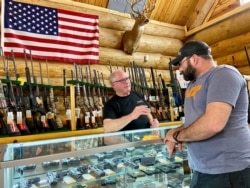A.C.'s parents would not let him shoot a rifle. So, at age 17, two months after finishing high school, he joined the U.S. Marine Corps, where he regularly shot an M16 rifle, a staple of America's military.
A.C., who requested that VOA not use his name, is now in his 25th year with a major police department in Southern California. He's also been a firearms instructor for 20 years. For him, as for millions of Americans, guns are a passion.
"Firearms are kind of my life," A.C. told VOA. "I enjoy firearms; I teach firearms responsibly. Guys who are collectors of cars can identify a headlight. I can do that with [the parts of] guns."
A.C. aims and fires two semiautomatic rifles at a California outdoor range to show how similar they are. Yet the Smith & Wesson M&P-15T is outlawed in California and the Smith & Wesson M&P 15-22S is not. The tactical semiautomatic was banned in the state when Vice President Kamala Harris was California's attorney general. A.C. can own it because he uses it on the job as a police officer.
A.C. is not interested in discussing the politics of America's gun debate. He says it's important to distinguish between crimes committed with firearms and the mechanical parts that come together to form a gun.
"It's the intent of the weapon [user], not the weapon itself," said A.C., that should determine how a gun is classified. For him, the term "assault weapon" so often bandied about is problematic.
"It should not be termed an assault weapon unless the shooter intends to use it to assault someone," he said.
Assault rifle vs. regular rifle
The definition of an "assault weapon" is a dividing line between gun enthusiasts and those who want to regulate firearms. In 1994, the U.S. Congress enacted a 10-year ban on assault weapons.
The now-expired law described a semiautomatic assault rifle as a gun with a detachable magazine (the mechanical device that houses multiple bullets that automatically reload but require a separate pull of the trigger to fire) and at least two other gun characteristics that include: a specific stock or pistol grip, bayonet, flash suppressor or grenade launcher.
More guns than Americans
The Small Arms Survey, done by an independent research organization in Switzerland, found the United States awash with firearms. It estimates 120.5 guns exist for every 100 Americans, far from the closest country of Yemen with 52.8 per 100 people. A Pew Research survey found that 42% of all Americans live in households with a gun.
The National Shooting Sports Foundation (NSSF), a gun industry association, says 20 million semiautomatic weapons — termed "modern sporting rifles" — exist in the United States. The favorites among gun owners are the AR-type guns. Despite what some think, AR does not stand for "assault rifle." It indicates the original gun-maker Armalite Rifle (now Colt), which developed the AR-15. The National Rifle Association (NRA) nicknamed the AR-15 "America's Rifle" because of its tremendous popularity.
Gun enthusiasts say that popularity is no mystery. The AR-15 is lightweight, rugged, and customizable with little recoil, making it more accurate and easy to use.
Tennessee gun enthusiast Rob Weaver says the AR-15 is the only semiautomatic weapon his wife, Jane, can shoot.
"It doesn't hurt her to shoot it," he told VOA. "The AR has an adjustable-length stock. She can make this sucker exactly what she wants within plus or minus infinity."
Weapon of choice
The AR models' appeal and ubiquity make them the weapon of choice for many mass murderers. In March, a shooter in Boulder, Colorado, killed 10 people at a supermarket with a Ruger AR-556. Police say the shooter who killed eight people at an Indianapolis FedEx facility earlier this month also used a Ruger AR-556, along with another AR-style rifle.
Landon Burke and his two best friends drove 45 minutes from North Carolina into Virginia to target shoot four guns at an outdoor range. Burke, 20, fired his GSG-5 .22 and his AR-15, which he readily admits is an assault weapon.
"It's just a good gun to have. I mean, I just wanted it. I can buy it, so why not?" Burke said, adding they should not be outlawed.
"People kill people," not guns, he said. "If you, like, have proper gun technique and you know how to operate them, then you shouldn't be worried."
AR 'sells itself'
The sign on the door outside Barnett's Guns and Indoor Range lists the Ten Commandments. Another sign reads: "Guns are welcome here." Inside are 1,500 guns awaiting purchase.
Tim Barnett's multimillion-dollar business has been in Hampton, Tennessee, for nearly nine years.
"We opened the same day [Barack] Obama won reelection," said the self-described "hillbilly" with a Southern drawl. Barnett said Americans love guns for self-defense, hunting and because movies "glamorize" the AR.
"Your AR is your No. 1 gun used because it sells itself in movies," Barnett said.
Kris Brown has shot at a gun range and enjoys skeet shooting. But she doesn't own a gun. She's trying to regulate high-powered firearms as president of Brady, an anti-gun violence group. It was launched after the 1981 assassination attempt on then-President Ronald Reagan that left his press secretary, James Brady, permanently disabled.
The organization fought to get the 1993 Brady Bill passed, which requires background checks on all gun purchases from licensed dealers. Today, Brown wants the White House and Congress to restrict high-powered semiautomatics like the AR-style rifles.
"We have seen a rapid increase of the use of these weapons," Brown said. "Their prototypes were weapons of war that our soldiers did not use in Vietnam because it stopped them from being able to take enemy combatants alive. Let's just face it, there is a velocity from these guns. That means, when those bullets hit bodies, there's nothing left."
Rob Weaver is shooting one of those precursor guns at an outdoor gun range in Tennessee. His gun, the Russian SKS Carbine with a bayonet on the front, is the precursor to the AK-47, the worldwide military assault rifle first used by the Soviet Union and termed "the gun that changed the battlefield."
Weaver, who once owned a shooting range in Maryland, doesn't believe in further controls on the AR or other semiautomatics, comparing gun ownership to another thorny topic: drunken driving.
"It's not the car that makes the drunk driver drunk," he said. "It's not the gun that makes a mass murderer a mass murderer."
Brown disagrees.
"It is often, in fact, the gun that makes a shooting a mass shooting," she said. "… Just like there are laws to prevent people who have demonstrated they are not responsible enough to operate a car, we have laws that similarly restrict access to dangerous firearms for those who should not have them."
'Every day … 316 people are shot'
Brown was at the White House on April 8 when President Joe Biden declared, "Every day in this country, 316 people are shot."
Biden pledged to make what he called "the epidemic of gun violence" a top priority of his administration, focusing on strengthening background check requirements and cracking down on so-called "ghost guns" that can be made with a kit.
Biden also is urging registration of stabilizing braces, expanding "red flag laws" to alert law enforcement of someone believed to be dangerous who has a gun, and making gun manufacturers legally liable for harm caused by the weapons they make.
As a senator in the 1990s, Biden was instrumental in getting the 1994 Assault Weapons Ban passed. The measure expired in 2004 and should be renewed, Biden said.
"There's no reason someone needs a weapon of war with 100 rounds, 100 bullets, that can be fired from that weapon," the president said.
Flowers for 40,000
To try to sway Congress, another gun prevention organization, Giffords, recently placed silk flowers on the National Mall near the U.S. Capitol. The flowers represented the 40,000 Americans who die by gun violence each year, as a plea for Congress to act on universal background checks and other gun legislation.
The Gun Violence Memorial stood on the mall for four days in April, a few days after Biden made his gun violence prevention remarks.
Giffords is a gun control group led by former U.S. Representative Gabby Giffords, who was shot in the head during a 2011 campaign appearance in Arizona. Six others were killed.
Looking for compromise
Few gun enthusiasts agree with gun restrictions, believing they will lead to confiscation of firearms by the government and erosion of the Second Amendment of the U.S. Constitution, which enshrines the right to gun ownership as part of a "well regulated Militia." Gun owners consider it a sacred right, passed down by the country's forefathers, not to be tampered with in any way.
Proponents of gun restrictions note that America's Founding Fathers, who lived during an era of single-shot muskets, could not have conceived of modern weapons capable of killing scores of innocent civilians in a matter of minutes.
Some gun enthusiasts do support basic regulation of firearms. Gun store owner Barnett favors making background checks universal in the United States by expanding them to include firearms purchased at gun shows and online.
Individual states determine gun regulations. Currently, 22 states and the District of Columbia require background checks for all gun sales. Background checks serve to flag those with a history of violent crimes, domestic abuse, suicidal tendencies or other mental health issues.
Barnett said gun shops can also turn down buyers, adding, "Just yesterday, we had one come over here from the local Woodbridge [a hospital for mental health treatment] with the bracelets still on showing that they just got out and wanting to buy a gun."
Most Americans agree with Barnett and support universal background checks. A Morning Consult/Politico survey showed that 84% support the idea.
Despite decades of congressional inaction on gun legislation, observers say expanding background checks could be the focus of a narrow area of compromise on Capitol Hill this year — one supported by gun control advocates and a substantial number of gun enthusiasts.




